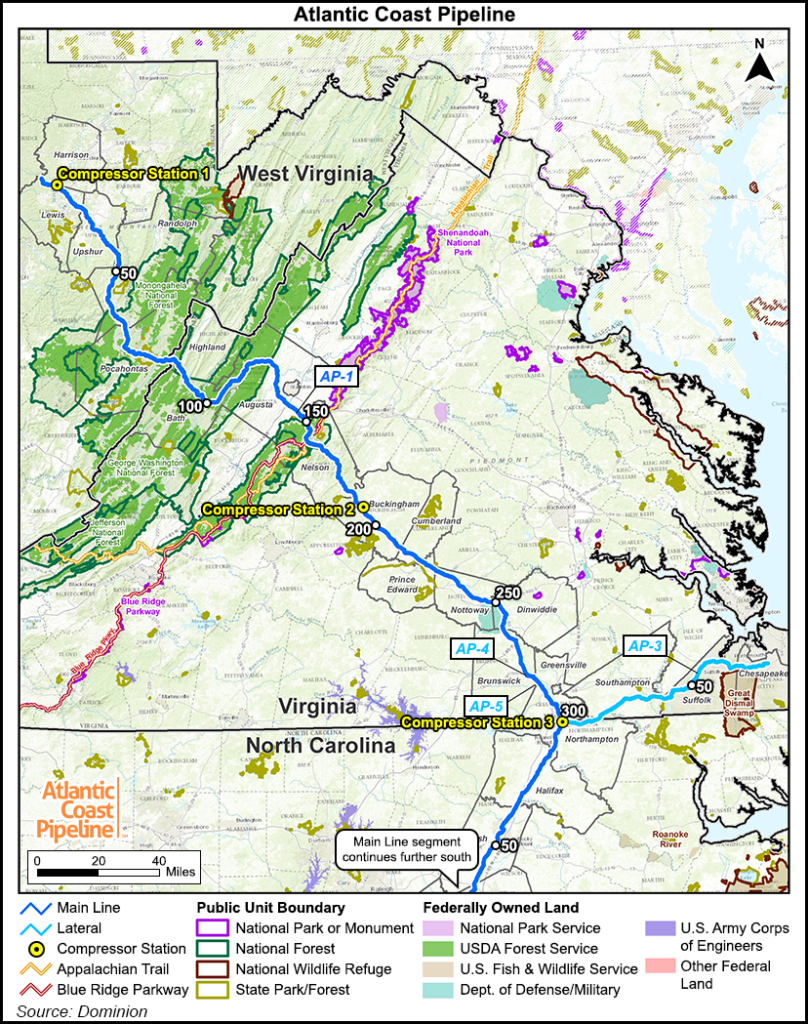Regulatory | Infrastructure | NGI All News Access
Enviros Cheer as NC Asks for More Details on Atlantic Coast Pipeline Water Permit
Atlantic Coast Pipeline LLC (ACP) opponents are celebrating a data request filed Thursday by North Carolina’s Department of Environmental Quality (DEQ) that they say will lead to greater scrutiny of the 600-mile, 1.5 Bcf/d natural gas transmission project.

Following a public comment period and public hearings held over the summer, the DEQ sent a request to ACP Thursday asking for additional information as the agency considers whether to issue a Clean Water Act (CWA) Section 401 water quality certification to the pipeline.
In a four-page letter to the project developers, DEQ asked for more details on proposed stream crossings, drinking water well testing, sedimentation and erosion control and cumulative impacts, among other issues. The letter refers to comments and concerns raised during a June 16-Aug. 19 public comment period.
“Please be aware that you have no authorization under the Section 401 of the Clean Water Act…for this activity and any work done within waters of the state or protected riparian buffers may be a violation of North Carolina” law, DEQ wrote.
Project opponents were viewing the request for more information as a de facto delay, since it effectively gives DEQ more time to decide on ACP’s application.
DEQ has 60 days from the time an application is received to reach a decision. DEQ received ACP’s application May 8; the countdown on those 60 days stopped during the public comment period, meaning DEQ would have had to reach a decision this month.
With Thursday’s data request, DEQ reset the clock and will have another 60 days to review ACP’s application once the company responds to the request, according to information provided by a DEQ spokeswoman.
“We applaud Gov. Roy Cooper and DEQ for listening to North Carolinians and requiring” ACP backers “Duke Energy and Dominion to provide more information so the state can thoroughly examine the water impacts that the Atlantic Coast Pipeline would have on our communities,” Sierra Club Beyond Dirty Fuels Director Kelly Martin said. “The fracked gas ACP would be a dirty, dangerous, expensive relic of a bygone era, and there’s no reason North Carolinians should foot the bill for an unnecessary project when clean, renewable energy sources such as wind and solar are affordable and abundant here in North Carolina.”
Dominion Energy spokesman Aaron Ruby told NGI Friday that DEQ’s request “is nothing out of the ordinary. It’s a normal part of the process for agencies to request additional information based on public comments. That’s why agencies ask for public comment. We’ll provide the information promptly so DEQ can complete its review.
“…We’ve always supported a rigorous and transparent process, and that hasn’t changed. This project has received more regulatory scrutiny than any other project of its kind, and with extensive public review and participation,” Ruby said. “That obviously doesn’t satisfy the groups who want to ‘keep it in the ground.’ They’re not interested in the process unless it leads to the total eradication of fossil fuels from the American economy, and that’s not going to happen.”
The state CWA 401 reviews for pipelines have become a focal point for project opponents after New York’s Department of Environmental Conservation denied Constitution Pipeline LLC’s water quality permit last year, putting that project in limbo even though it received FERC approval.
ACP opponents have taken an interest recently in Virginia’s Department of Environmental Quality CWA 401 process, urging the agency to step up its scrutiny of the pipeline.
ACP has received a final Environmental Impact Statement from the Federal Energy Regulatory Commission and is looking to secure a certificate this fall.
The roughly $5 billion greenfield project, a joint venture between Dominion, Duke Energy, Piedmont Natural Gas and Southern Company Gas, would travel through West Virginia, Virginia and North Carolina, transporting Marcellus and Utica shale gas to serve heating and electric generation demand in the Southeast.
ACP is targeting an in-service date in 2019.
© 2024 Natural Gas Intelligence. All rights reserved.
ISSN © 1532-1231 | ISSN © 2577-9877 |
